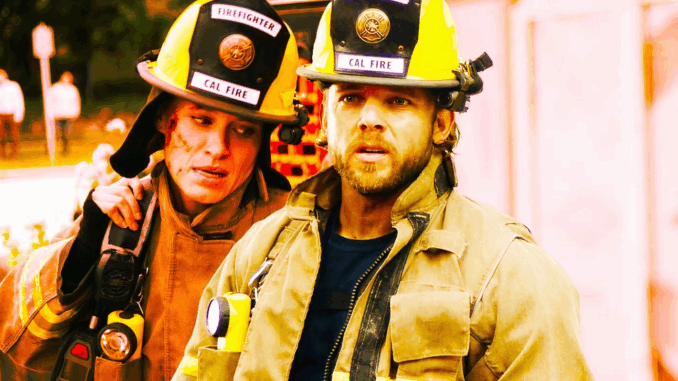
A Burned-Out Hero at a Crossroads
For three seasons, Fire Country has been the story of redemption through fire. At the center of it all is Bode Donovan, the complicated son of Edgewater, a former convict turned inmate firefighter who rose through the ranks fueled by guilt, purpose, and love.
But as Season 4 looms, that narrative may have run its course. With Vince Leone dead, Gabriela Perez gone, and Three Rock shut down, Bode now finds himself standing in the ruins of everything that once gave him hope. His silence is louder than his screams. His courage is buried beneath grief. And so a radical possibility emerges — one that could redefine Fire Country forever:
👉 What if Bode walked away from firefighting for good?
It Wouldn’t Be Quitting — It Would Be Surviving
Firefighting saved Bode’s life. But just because something saves you once doesn’t mean it should define you forever. In many ways, continuing to fight fires has become a form of penance for Bode — a way to prove he deserves forgiveness. But with every loss, that fire inside him is turning toxic. The adrenaline that once empowered him now erodes him.
Walking away wouldn’t mean failure. It would mean choosing survival over self-destruction. And for a character like Bode, that might be the bravest thing he’s ever done.
Signs the Show Is Already Leaning in This Direction
There have been subtle clues throughout Season 3 that Bode is burning out emotionally:
-
He no longer believes in redemption the way he once did.
-
He questions his own ability to make the right choices.
-
His relationships have either collapsed or become unbearably strained.
-
He watches others move forward — while he remains stuck in an emotional purgatory.
If Season 4 continues on this trajectory, we may see a version of Bode who doesn’t pick up the hose. Instead, he may be forced to pick up the pieces of himself.
A Different Kind of Hero’s Journey

Traditionally, stories like Fire Country focus on characters proving themselves through heroic action. But what if Bode’s greatest act of courage isn’t in charging into a fire — but in stepping away from it?
Imagine this version of Season 4:
-
Bode volunteers at a center for ex-inmates, becoming a mentor.
-
He avoids fire calls, even when asked, choosing instead to support from the sidelines.
-
A major fire threatens Edgewater — and Bode doesn’t show up until the very end, not out of cowardice, but as a choice to protect his heart.
-
He finally sits with Sharon and talks — truly talks — about Vince, about guilt, about what he wants outside of fire.
This wouldn’t be a story of abandonment. It would be a story of agency.
The Impact on Station 42
Bode leaving the job would send shockwaves through Station 42:
-
Jake may feel betrayed, having stood by Bode through years of conflict.
-
Eve may understand — and even secretly envy — Bode’s ability to step away.
-
Sharon would likely feel torn: wanting her son safe, but also wishing he’d carry Vince’s legacy.
-
Manny, if still around, might question everything he ever believed about second chances.
And Gabriela, watching from afar, might finally realize that Bode isn’t who she left — he’s someone entirely new, someone she no longer recognizes, or someone she could love again.
Rewriting the Message of Redemption
From the beginning, Fire Country has framed redemption as a path that involves doing good, often in dangerous ways. But what if the show dared to ask: Is healing only possible through suffering? Or can we allow our characters to find peace, even if it means walking away from the very thing that defined them?
Letting Bode leave the fire service doesn’t abandon the show’s core themes — it deepens them. It challenges the audience to consider how trauma is healed, and whether systems like Cal Fire or the prison-industrial complex offer redemption — or merely prolong punishment in another form.
What Bode Could Become Instead
If Bode leaves firefighting, that doesn’t mean he disappears. It opens the door for:
-
Community work: Bode creating a program for at-risk youth or recently released inmates.
-
Public speaking: Telling his story not as a hero, but as someone who broke and rebuilt quietly.
-
A local business: Maybe he works at Sharon’s side in Vince’s memory, helping the town rebuild.
-
Family: Maybe, for the first time, he considers building a life with a future — not just running from his past.
Letting him evolve beyond the flames doesn’t betray the show — it elevates it.
Would Fans Accept It?
Some fans might resist this direction. After all, Fire Country thrives on high-stakes rescues, smoke-filled drama, and emotional cliffhangers. But great storytelling also knows when to shift tones.
Think of iconic TV arcs like:
-
Jesse Pinkman’s emotional fallout in Breaking Bad
-
Jamie Fraser’s silent recovery in Outlander
-
Even Meredith Grey’s breaks from surgery in Grey’s Anatomy
Audiences respond not just to action, but to human vulnerability. Bode doesn’t need to keep walking into fire to be compelling. Watching him learn how to live without fire might be even more powerful.
Conclusion: Sometimes the Bravest Thing You Can Do Is Stop Running
Bode Donovan has been many things — son, inmate, firefighter, friend, almost-lover, and sometimes, enemy to himself. But as Fire Country enters Season 4, it has the opportunity to give him something rare in television:
👉 A path not of action, but of grace.
Let him stop.
Let him rest.
Let him choose a life that doesn’t burn him alive.
Because true redemption isn’t always in what you do for others — sometimes, it’s in what you finally allow yourself to believe you deserve.
And maybe, just maybe, Bode deserves to breathe.
